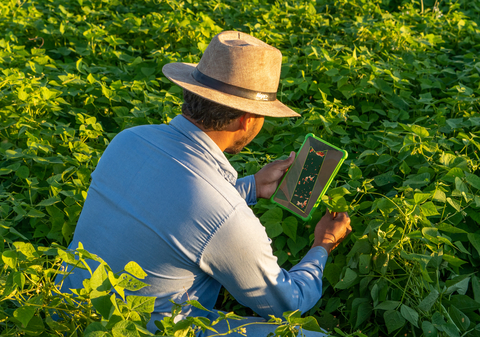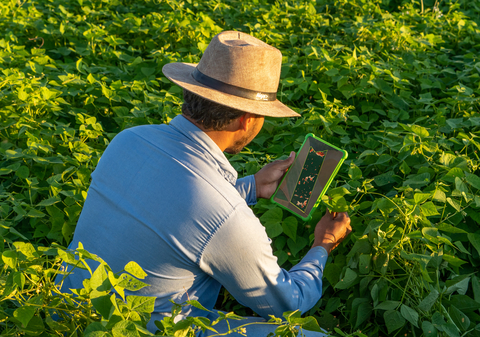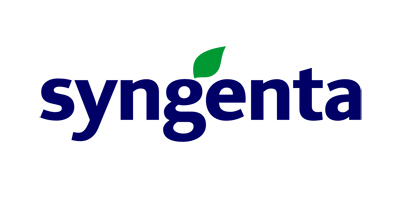BASEL, Switzerland--(BUSINESS WIRE)--Harmful nematodes that feed on roots of plants can cause major damage to crops, causing billions of dollars in damage. Today, Syngenta Crop Protection, a global leader in agricultural innovation, is launching the world’s first commercial digital solution to diagnose infestations of plant-parasitic nematodes in soybean crops by analyzing photographs taken from satellites. This marks a breakthrough in the management of this devastating pest and is a product of Syngenta’s focus on delivering an expanding portfolio of digital and precision agriculture solutions to farmers worldwide.
Plant-parasitic nematodes are microscopic parasites living in the soil that feed on plant roots, opening pathways to further fungal infections and threatening plant health, crop quality and yield. These harmful nematodes account for as much as USD 150 billion in crop losses globally each year.
The new digital tool uses a unique, proprietary algorithm to analyze images of fields obtained by satellites, allowing it to identify areas of high infestations of plant-parasitic nematodes in crops and estimate potential losses caused by these microscopic parasites. Using the tool, farmers can make quick adjustments to their field management practices, helping them avoid losses in yield, as well as optimizing the use of inputs, improving the sustainability of their farms.
Syngenta will first market this service to soybean farmers in Brazil, where the company already offers an extensive range of advanced digital solutions. Soybean is one of the most important crops in the world for its vital role in food production, and Brazil accounts for approximately 35 percent of global soybean production. In Brazil, plant-parasitic nematodes cause estimated losses in soybean production amounting to more than USD 5.4 billion a year. So far, the threat from harmful nematodes has been largely invisible and insufficiently understood, and estimates say that Brazilian farmers lose as much as 30 percent of their yield in highly infested areas.
“Harmful nematodes that devastate crops are a major threat to farmers and food security, and Syngenta is using cutting-edge digital solutions to help combat these pests,” said Jeff Rowe, President Global Crop Protection. “We are excited to be launching this product in Brazil, and there is great potential to scale this solution to other countries and crops and transform the decision-making capabilities for growers.”
This first-of-its-kind innovation is the culmination of a multi-year collaboration with Swiss-based AgTech startup Gamaya SA – a spin-off from Switzerland’s Federal Institute of Technology Lausanne – bringing together its highly specialized expertise in algorithm development together with Syngenta’s agronomic and crop knowledge. Syngenta is integrating this advanced digital solution within its own digital technology platform, CROPWISETM.
“At Syngenta, we will continue to invest in machine learning and data science, to develop further breakthrough offers for farmers,” said Feroz Sheikh, Chief Information and Digital Officer of Syngenta Group. “The technology is a great addition to our CROPWISETM platform, which already digitally connects almost 200 million acres of land, and underlines our commitment to invest in and partner with providers in the AgTech space.”
The introduction of the digital diagnosis and mapping tool for harmful nematodes comes as Syngenta launches TYMIRIUM® technology globally, its next-generation nematicide and fungicide for both seed and soil uses that can help farmers maximize crop output while preserving soil biodiversity and health.
About Syngenta
Syngenta is one of the world’s leading agriculture companies, comprised of Syngenta Crop Protection and Syngenta Seeds. Our ambition is to help safely feed the world while taking care of the planet. We aim to improve the sustainability, quality and safety of agriculture with world class science and innovative crop solutions. Our technologies enable millions of farmers around the world to make better use of limited agricultural resources. Syngenta Crop Protection and Syngenta Seeds are part of Syngenta Group. In more than 100 countries we are working to transform how crops are grown. Through partnerships, collaboration and The Good Growth Plan we are committed to accelerating innovation for farmers and nature, striving for regenerative agriculture, helping people stay safe and healthy and partnering for impact. To learn more visit www.syngenta.com and www.goodgrowthplan.com.
Follow us on Twitter at www.twitter.com/Syngenta, www.twitter.com/SyngentaUS and on LinkedIn at www.linkedin.com/company/syngenta
Data protection is important to us. You are receiving this publication on the legal basis of Article 6 para 1 lit. f GDPR (“legitimate interest”). However, if you do not wish to receive further information about Syngenta, just send us a brief informal message and we will no longer process your details for this purpose. You can also find further details in our privacy statement.
Cautionary Statement Regarding Forward-Looking Statements
This document may contain forward-looking statements, which can be identified by terminology such as ‘expect’, ‘would’, ‘will’, ‘potential’, ‘plans’, ‘prospects’, ‘estimated’, ‘aiming’, ‘on track’ and similar expressions. Such statements may be subject to risks and uncertainties that could cause the actual results to differ materially from these statements. For Syngenta, such risks and uncertainties include risks relating to legal proceedings, regulatory approvals, new product development, increasing competition, customer credit risk, general economic and market conditions, compliance and remediation, intellectual property rights, implementation of organizational changes, impairment of intangible assets, consumer perceptions of genetically modified crops and organisms or crop protection chemicals, climatic variations, fluctuations in exchange rates and/or commodity prices, single source supply arrangements, political uncertainty, natural disasters, and breaches of data security or other disruptions of information technology. Syngenta assumes no obligation to update forward-looking statements to reflect actual results, changed assumptions or other factors.
©2022 Syngenta. Rosentalstrasse 67, 4058 Basel, Switzerland.




